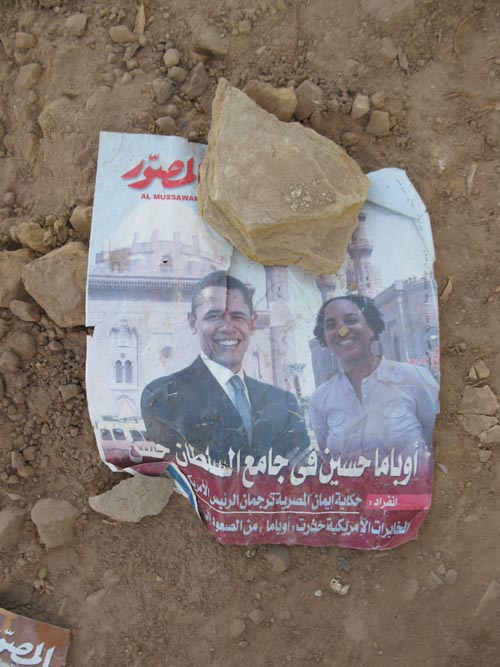The Lexus Is Hot And Crowded And The Olive Tree Is Flat: A Brief History Of January-February 2011
There's a Tom Friedman op-ed in the Times today about the "other factors" behind the upheaval in the Middle East. In short, Friedman identifies five "not-so-obvious forces" — beyond the "obvious" broad brushstroke reasons — that helped spur what's going on there today: Barack Obama's ethnic heritage; Google Earth; Al Jazeera's coverage of Israeli corruption scandals; the 2008 Beijing Olympics; and Palestinian Prime Minister Salam Fayyad's technocratic governing principles.
To start, Friedman's almost-strawman-like litany of broad brushstroke reasons — tyranny, rising food prices and youth unemployment — sort of no longer seem like reasons to me. For one, they haven't really changed in years. Two, they seem more like symptoms than reasons to revolt — there are tyrannical regimes, rising food prices and youth unemployment in a lot of places where people don't set themselves on fire.
The other broad brushstroke reason Friedman identifies, before launching into his comfortingly counter-intuitive list of factors at least — is social media. No question stuff like Twitter and Facebook helped the opposition communicate, but regimes also showed themselves to be fairly adept at shutting down the Internet when they want to. In the case of Egypt, the former (current?) regime probably didn't do it as quickly as they should have — if they wanted to contain the uprising, that is. You get the sense that Libya and other countries learned from Mubarak's "mistakes." So yes, social media helped — but it's still only a tool, not a reason.
And while it's comforting and maybe even "amazing" to think about how Barack Obama's middle name, Google Earth images of unused Bahraini land, the fact that Israeli politicians get their comeuppance, the idea that Egypt and China were both equally backwater and poor in the 1950s or the idea that they're good at picking up household garbage in the West Bank (I just think of Chris Rock here — "you're supposed to pick up the trash!"), it seems that Friedman is ignoring a very significant factor: Wikileaks.
Think what you want about Wikileaks — and the whole thing certainly wasn't pretty — but the effect of the cable dump goes way beyond "fascinating reading," as Friedman himself put it back in December. I think a case — a very good case, in fact — can be made that Wikileaks is at least as much a factor as, say, the Beijing Olympics. See for example:
Analysts agree that Tunisians in general were aware of the rampant corruption and plutocracy of Ben Ali's family, but the U.S. cables from Tunis added definition to the problems.
Activists in Tunisia translated and disseminated the documents in a website that focused particularly on the corruption allegations.
Word of the cables spread rapidly in the Internet-savvy country, said Radwan Masmoudi, president for the Center for the Study of Islam and Democracy. Tunisians "have the highest percent of Facebook users in the world per population, something like 2 million among 10 million people have their own Facebook account."
It goes on from there.
I gather that Friedman might be hesitant to praise Wikileaks, but spending time meditating on Barack Obama's middle name and not acknowledging the turn of events back at the end of November with the release of the diplomatic cables seems a little ostrich-like.
I think the first sense we got of how individual countries would cherry-pick information from the cables came from Pakistan, which reacted pretty quickly to the Pakistan-related disclosures (one day, it seems). Which is to say that while newspapers in the U.S. or Europe were busy trying to figure out what was the most salacious detail to focus on, it was a lot easier for certain countries to focus their attention on what was salient — i.e., their own regimes.
Michael got a sense of the power of Wikileaks when he found himself engaged in a conversation about the diplomatic cables with one of our guides in Egypt, who Michael said seemed pretty excited about it. Things the guide didn't make small talk about include the religious values Barack Obama, Sr. was raised with, the satellite layer on Google Maps, Ehud Olmert, the graceful lines of Beijing's Bird's Nest or how quickly they fix potholes in Ramallah.
If 2011 really turns out to be a watershed year in the Middle East then at some point we will have to come to terms with the uncomfortable idea that one of the main factors might turn out to be something that most people are pretty ambivalent about. Not a big deal — it just makes it harder to craft a tidy moral message in a middle school history textbook. Or the Times op-ed page, as the case may be.
Then again, maybe Friedman is actually on to something; I'm pretty sure the headline on this item we saw on the banks of the Nile River after disembarking from our Felucca Cruise reads "US President Barack Obama Tours The Middle East With One Of His Four Wives":

Or not . . .
See also the Big Map: Egypt/Jordan, December 27, 2010-January 11, 2011.
Posted: March 2nd, 2011 | Author: Scott | Filed under: National Geographical | Tags: Grand Egypt & Jordan Adventure, Julian Assange Died For Our Neo-Conservative Sins, Thomas Friedman's Ambivalent View Of Wikileaks

